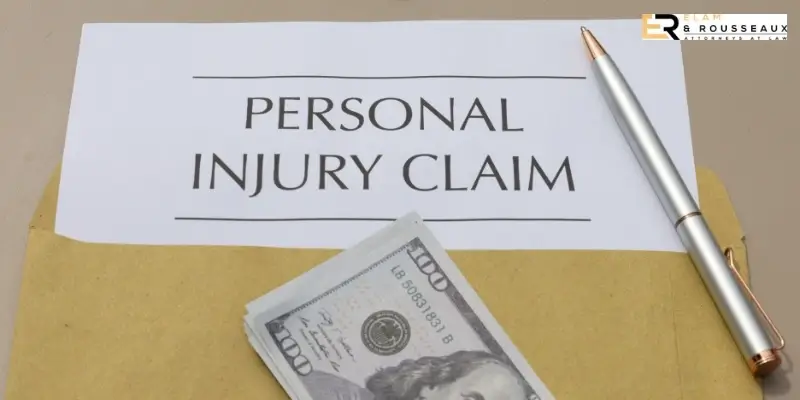|
|
Last Modified on Oct 13, 2025
If you were seriously harmed due to the negligence or recklessness of another person, a personal injury claim can be an important tool in getting justice. The team at Elam & Rousseaux, PLLC, is here to help you understand the steps to file a personal injury claim in North Carolina.
About Us
At Elam & Rousseaux, PLLC, we’ve spent decades helping the people of Charlotte, Greensboro, and throughout North Carolina. Our team has combined over 90 years of experience, handling cases ranging from minor disputes to settlements worth millions. Our founder, William (Bill) H. Elam, is ranked “AV” by Martindale-Hubbell, the highest rating the peer review institution awards.
Overview of North Carolina Personal Injury Claims
Personal injury claims are a common type of civil legal action available when your injuries were caused by someone’s negligence, intentional, or reckless behavior. In 2023, there were 69,509 personal injury claims filed nationwide. These cases cover a wide range of scenarios and fields. Common types of North Carolina personal injury claims include:
Medical Attention
The first thing you should do in the direct aftermath of an accident is seek medical attention. Your health and well-being are always the primary concern. There are several 24/7 emergency rooms located around Charlotte and North Carolina. The largest facility is in the Atrium Health Carolinas Medical Center, located at 1000 Blythe Blvd, Charlotte, NC 28203.
Evidence Collection
Once your condition is stabilized, the next step is to collect evidence to support your case. North Carolina has strict contributory negligence laws and legal precedent. If you are found to be even 1% responsible for your injuries, you may be barred from receiving compensation. This is why it is crucial to have strong evidence before filing your case. Some examples of evidence used include:
- Medical records
- Photos and videos of the site
- Witnesses
- Police reports
- An injury diary
- Texts, emails, and social media posts
- Physical evidence
File Your Case
Once you have a strong base of evidence, it is time to file your case with the courts. All personal injury cases start with two forms. The first is a civil complaint. This is a document where you describe the incident that injured you, how the other person was responsible, the details of your injuries, and a demand for compensation. The next aspect is a civil summons signed by the clerk and served to the defendant.
Discovery Phase
After the defendant has been served, both sides enter the discovery phase. This is typically the longest and most important step of a case. Both parties will review the details of the case, going over all the evidence and deciding what will be admitted into consideration.
Settlement Discussions
A vast majority of all civil cases, including personal injury claims, are settled before reaching trial. The injured party will send a demand letter reiterating the ways the incident impacted their life and include a specific dollar amount they want. Negotiations will then begin, typically with both sides producing several different offers.
Trial
In the rare instance that you are unable to settle, the case will then go to trial. The evidence and arguments established in the discovery phase will be presented, with each side getting the chance to respond to the other. Trials can last anywhere from a few days to weeks or months, depending on the case.
Hire a Personal Injury Lawyer in North Carolina
While it is possible to go through these steps on your own, it is highly recommended that you hire a personal injury lawyer for your case. Your North Carolina personal injury lawyer can help you with every step of your case, from initial filing to negotiating the settlement or representing you in court. Personal injury cases can be frustrating, but you don’t have to go through yours alone.
FAQs
How Much Does It Cost to Hire a Personal Injury Lawyer in North Carolina?
The cost of your North Carolina personal injury lawyer depends on the complexity of your case, whether litigation is necessary, and the work hours it requires. A car accident with overwhelming evidence and a defendant who is eager to settle tends to cost less than a case revolving around permanent disability and a lengthy trial. Your personal injury lawyer can provide an estimate of how much your final bill may be.
How Long Do You Have to File a Personal Injury Claim in North Carolina?
In North Carolina, you generally have three years after an accident to file a personal injury claim against the liable parties. There are some less common cases where you may be given more or less time. For instance, if the injured party is a minor, the three-year timeline only starts once they turn 18. Another exception is in the case of medical malpractice. In these situations, you may have an additional year to file.
What Is the Hardest Injury to Prove in a North Carolina Personal Injury Claim?
The hardest injuries to prove in a North Carolina personal injury case are those that do not show up on traditional tests. Things like chronic pain, headaches, memory loss, and brain fog are all ailments that can be severe hindrances, yet CT scans and MRIs can show normal function. Clear documentation of efforts to seek treatment and legal assistance from an experienced personal injury attorney can both raise your chances of a successful case.
Will Your Personal Injury Claim Go to Trial in North Carolina?
Your personal injury claim will most likely not proceed to trial or to a court verdict. An overwhelming number of civil cases are settled outside of court between the parties, as litigation can be expensive for both parties. If you are concerned about whether your case can be settled, consult a North Carolina personal injury attorney who can assess your chances of reaching a settlement that works for you.
Speak With a Personal Injury Attorney Today
Our team at Elam & Rousseaux, PLLC, has the knowledge and experience necessary to help with your personal injury case.
Contact us today for an initial consultation, where we can discuss the details of your claim and provide legal pathways forward. You may also visit our Charlotte office — located on North McDowell Street, just north of Elizabeth Park and American Legion Memorial Stadium.





